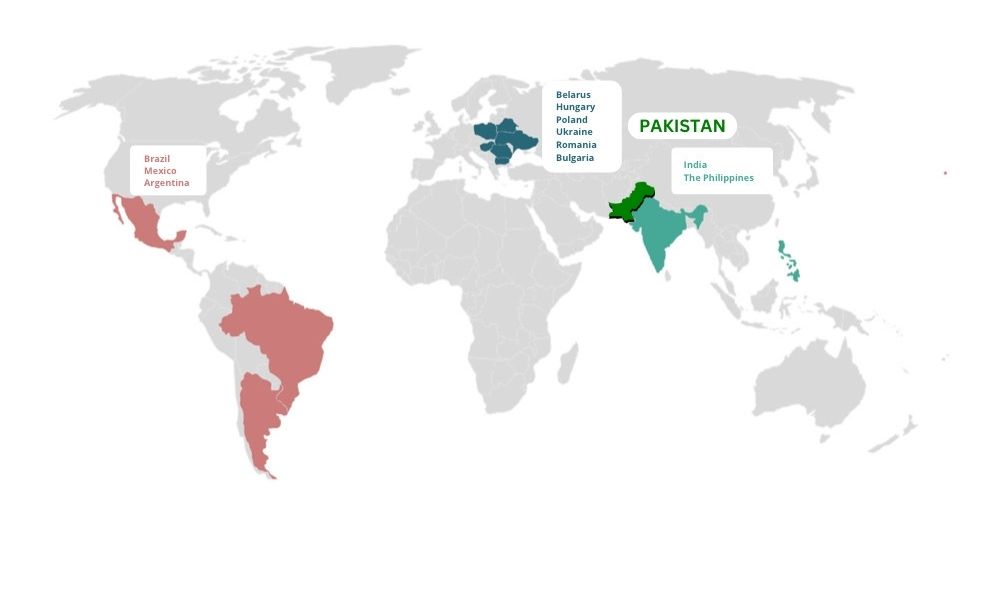Are you seeking a Cost-Effective Solution for Meeting Software Project Deadlines without exceeding your budget? Do you wish to sidestep the high expenses associated with in-house tech recruitment while maintaining project quality and speed?
Benefits of Hiring an Offshore Development Team
Explore the benefits of outsourcing your company’s projects and discover effective ways to offload some of your team’s workload in this blog post. We’ll provide insights to help you create a successful offshore recruitment strategy for development teams, along with a step-by-step checklist for a seamless process.
An offshore developer, often referred to as an OSD, is a software developer who undertakes various software development projects remotely. These projects are typically outsourced to offshore development companies, which are third-party organizations located in countries known for a robust tech talent pool and lower living costs. This unique combination allows these companies to offer competitive IT services without compromising on quality.
For instance, if you’re a US-based organization and you choose to hire developers located in Asia, you’re engaging in offshore software development.
Why Consider Hiring Offshore Developers? There are several compelling reasons to consider building an offshore development team for your organization.
Key Benefits: Major Advantages, Notable Pros, Primary Benefits
1. Expand Your Talent Pool:
Hiring offshore developers allows you to tap into a global IT talent pool, making it easier to find the right talent for your specific needs. Whether you require app developers with expertise in React Native or the jQuery Mobile framework, your chances of finding a skilled developer increase significantly when you explore remote hiring options.
2. Boost Productivity and Flexibility:
Outsourcing some of your software development tasks can enhance your productivity. The fresh perspectives and problem-solving abilities brought by offshore talent can help overcome development roadblocks. Additionally, outsourcing to a company with specialized technology can improve task efficiency, making your organization more flexible and adaptable.
3. Conflict Resolution:
By working with offshore developers, you can reduce conflicts that may arise within your core team. This external collaboration can lead to smoother project execution and improved team dynamics.
4. Scalability:
Offshore development teams provide scalability, allowing you to scale your projects up or down as needed. This flexibility is particularly beneficial for managing varying workloads.
5. Meeting Deadlines:
Offshore developers can help you meet project deadlines with ease, thanks to their expertise and commitment to delivering high-quality work.
6. Cost Savings:
Outsourcing to offshore developers can be cost-effective, as you can often access top-notch talent at a lower cost compared to hiring locally.
In the following sections, we will delve deeper into these advantages, highlighting how offshore developers can positively impact your organization’s success.
Why Opting for Offshore Development Teams Is a Strategic Decision: A Comprehensive Analysis
Conflict can pose a significant threat to the progress of startups, with disagreements between co-founders being a key contributor to the failure of up to 65% of high-potential startups. Minor disputes can escalate into major divides, but there’s a strategic solution to prevent this scenario.
By opting for offshore developers, you can proactively avoid conflicts, especially during the critical MVP (Minimum Viable Product) development phase. This approach ensures a smooth journey, sidestepping disagreements over budgetary constraints or recruitment costs.

Time Zone Differences: Coordinating work across varying time zones can lead to scheduling difficulties and slower response times.
Language Barrier: Communication breakdowns may occur due to language differences, hindering effective teamwork and clarity.
Remoteness: Managing remote team members can be challenging, as it requires trust-building and effective tools for remote work.
Cultural Differences: Diverse cultural backgrounds can lead to misunderstandings and differences in work practices and expectations.
Poor Communication: Insufficient or unclear communication can hinder project progress and team cohesion, requiring proactive efforts to enhance communication channels.
Seamless Scaling of Projects If your organization excels in attracting clients and striking deals but struggles with larger-scale projects due to resource limitations and technological constraints, outsourcing holds the key.
Collaborating with an offshore development company equipped with the requisite resources can empower you to tackle even the most demanding projects that surpass your in-house capacity.
Streamlined Software Development Outsourcing: Enhancing Efficiency
Effortless Project Deadlines with Tech Expertise Outsourcing software development not only enhances your ability to meet clients’ demands but also guarantees consistent project completion within deadlines.
With the backing of an offshore team comprising highly skilled developers, you’ll accelerate your project timeline without compromising quality or consistency. Outsourcing grants access to a global talent pool, ensuring that you have some of the world’s finest experts on your side.
Cost-Effective Development If you seek top-notch development work without stretching your budget, outsourcing proves to be a cost-effective solution.
Beyond avoiding the elevated costs associated with in-house team recruitment (which typically incurs almost 58% more expenses compared to outsourcing), you eliminate the need for additional investments in infrastructure, technology, and training to achieve project objectives.
Challenges of Offshore Development Team Hiring While offshore development offers numerous advantages, challenges may arise, including difficulties in arranging in-person meetings with offshore partners, addressing the nuances of remote collaboration, language barriers, and occasional project delays. These obstacles, however, can be managed effectively with strategic planning and communication.

Challenges and Solutions in Offshore Development Collaboration
1. Challenges with In-person Meetings
Due to geographical differences, arranging face-to-face meetings with offshore teams can be logistically challenging. Most interactions will likely be virtual, necessitating robust video conferencing tools and creative scheduling to accommodate different time zones.
2. Navigating the Remote Working Paradox
The proliferation of remote work tools like Zoom, Microsoft Teams, Slack, Asana, and Trello has streamlined collaboration but introduced the remote working paradox. Time zone disparities can lead to asynchronous communication, potentially resulting in misalignment and project errors. Real-time brainstorming and spontaneous idea sharing may be limited between in-house and offshore teams.
3. Overcoming Language Barriers
Language differences can pose communication hurdles when working with offshore teams. If your in-house and offshore teams don’t share the same language, it’s essential to address this challenge. Consider strategies like avoiding humor that relies on cultural context, encouraging team members to clarify information, and utilizing written communication, such as emails and chat, to enhance understanding.
4. Managing Project Delays
Delays can occur due to language barriers and asynchronous communication. While various communication tools are available, such as email, chat, task management software, and video conferencing apps, delays can persist. Anticipating these delays and choosing the appropriate communication method is crucial. Synchronous communication is ideal for urgent deadlines, extensive project modifications, and issue resolution. In contrast, asynchronous communication suits tasks without tight deadlines, feedback sessions, and project updates.
Top Locations for Sourcing Offshore Developers If you’re considering offshore development.
Top regions to explore
1. Eastern Europe
Known for its skilled tech workforce, Eastern Europe offers a favorable mix of talent and cost-effectiveness.
2. Latin America
Latin American countries provide proximity to North America, enabling easier time zone coordination and cultural alignment.
3. Asia
Asian countries like Pakistan, India, the Philippines, and Vietnam are popular destinations for offshore development, offering a vast talent pool and cost savings.
Each of these regions has its unique advantages, and the choice depends on your specific project requirements and preferences.
Exploring Offshore Development Regions: Eastern Europe, Latin America, and Asia
Eastern Europe Eastern Europe stands out as a prime destination for outsourcing work to offshore developers. It offers several compelling advantages:
1· Efficient Hiring Process:
Hiring candidates for outsourced projects in Eastern Europe is notably faster compared to many other regions.
2· English Proficiency:
Developers in Eastern Europe often have strong English language skills, mitigating potential language barriers.
Notable Countries in Eastern Europe:
1. Belarus: Boasts 225 companies specializing in IT project outsourcing.
2. Hungary: Home to 71 companies facilitating IT project outsourcing, including software development.
3. Poland: Hosts 658 companies suitable for outsourcing development and IT projects.
4. Ukraine: Offers a choice from more than 1,000 companies for outsourcing IT development tasks.
5. Romania: Provides 249 IT development outsourcing organizations.
6. Bulgaria: Houses 156 companies specializing in IT and software development projects.
Latin America Latin America offers unique advantages for offshore development, particularly for US-based companies:
Minimal Time Difference: The time zone proximity is favorable for US companies, reducing communication challenges.
Geographic Proximity: Latin America’s closer geographic location makes organizing events and meetings more accessible and cost-effective.
Strong Educational Background: Developers in Latin America typically have a solid educational foundation.
Key Figures for IT Outsourcing in Latin America:
1. Brazil: Features over 180 high-quality IT outsourcing organizations.
2. Mexico: Offers more than 340 organizations facilitating project outsourcing for IT companies.
3. Argentina: Home to over 190 IT development project outsourcing companies.
4. Asia: Asia boasts a vast tech talent pool, with over 10 million developers, making it a compelling choice for outsourcing IT development projects:
Widening Talent Pool: Outsourcing to Asia expands your access to a diverse talent pool.
Prominent IT Development Outsourcing Numbers in Asia:
1. Pakistan: Pakistan is an emerging IT outsourcing destination with a growing number of IT firms. It provides cost-effective solutions and is increasingly considered for software development and IT-enabled services.
2. India: Offers a selection of more than 1,880 IT development outsourcing firms.
3. The Philippines: Houses approximately 60 organizations specializing in outsourcing IT projects for companies.
The choice of region for offshore development depends on your specific project requirements, time zone preferences, and strategic objectives.
Hiring Offshore Developers for Your Startup: A Comprehensive Guide

Navigating the process of hiring offshore developers for your startup can be complex. To help you streamline this journey, we’ve created a step-by-step checklist to ensure a smooth and successful outsourcing experience:
1. Define Your Business Goals
Start by identifying your business’s key targets and objectives. What do you aim to achieve with your Minimum Viable Product (MVP)? Break down your development project into achievable milestones to facilitate communication with external teams.
2. Budget Consideration
Determine your budget, including salary ranges and recruitment costs. Allocate your budget to specific areas, such as sourcing and onboarding. Research candidate locations and their associated salary ranges to align with your outsourcing goals.
3. Job Analysis and Skill Requirements
Conduct a thorough job analysis to understand the role’s nature, responsibilities, and required skills. Define whether you need a work-oriented approach, focusing on duties, or an employee-oriented approach, emphasizing specific skills.
4. Identifying Essential Hard Skills
Clearly specify the hard skills required for your project. Determine which programming languages or frameworks are essential for success. Highlight sub-skills and domain-specific expertise relevant to your project in the job description.
5. Compelling Job Description
- Craft a compelling job description with essential elements:
- Clear job title with relevant keywords
- Role summary
- Company overview and culture description
- Perks and benefits
- Skill requirements
- Responsibilities
Essential Steps for Offshore Development Success
1. Assess Geographical Locations
Collect data on potential offshore development locations, considering time zones, salary expectations, and cultural differences. Choose between nearshore and offshore outsourcing models based on your organizational needs.
2. Review Performance and Track Record
Evaluate the performance and project track record of offshore developers. Seek reviews on platforms like Clutch, DesignRush, and Aciety, and request references from previous clients to assess their project success.
3. Determine Project Time Frame
Define the project’s duration and assess candidates’ ability to commit to it. Look for developers with experience in projects similar in length and complexity, checking their success rate with previous clients.
4. Align Workflow
Ensure that the workflow of your offshore developers aligns with your organization’s processes. Compatibility in methodologies, such as agile or waterfall, is essential for seamless collaboration.
5. Avoid Choosing Solely Based on Rates –
Opting for the cheapest option may lead to subpar results. Instead, compare profiles and offerings to find a team that offers both competitive rates and high-quality work. Emphasize the significance of value and excellence rather than focusing solely on the lowest price.
By following this checklist, you’ll be well-prepared to navigate the complexities of hiring offshore developers for your startup, ensuring a successful partnership and project outcome.
6. Secure Your Data with a Non-Disclosure Agreement (NDA)
Protect your sensitive data and ideas by requesting your offshore development team to sign a legally binding non-disclosure agreement (NDA). This agreement ensures the confidentiality of your information and allows legal action in case of data disclosure to external parties.
Why Companies Require NDAs for Offshore Teams
Safeguarding your unique ideas and intellectual property is paramount. An NDA ensures that your software, app, or product concept remains exclusively yours, preventing information leaks and unauthorized use by offshore developers.
Key Elements of an NDA
An effective NDA should include:
- Identification of the parties involved
- Definition of the protected data or idea
- Usage and sharing guidelines for the data
- Duration of the agreement
- Consequences for breaching the agreement
12. Optimize Workflow with Top Project Management Tools
Efficient project management tools bridge the gap between in-house and offshore teams, facilitating project planning and execution. Consider these top project management tools to enhance your workflow:

GitHub
Ideal for managing code changes, tracking developer contributions, sharing code files, and managing repositories. Known for its code review tools and broad developer adoption.
Jira
Facilitates project planning, monitoring, and release phases, offering customizable workflows, Kanban or Scrum boards, and backlog management.
Bitbucket
Combines project and code management, allowing simultaneous code building and testing. Integrates task management boards with platforms like Trello.
GitLab
Suitable for lean and Agile project management, offering Kanban and Scrum boards. Provides insights into performance impact for changes.
Trello
Effective for tracking progress on tasks and simple assignments. Offers integration options and visual progress tracking with Kanban boards.
Evaluating Offshore Development Team Skills
To hire a reliable offshore development team, you must assess their skills accurately. Utilize structured and behavioral interviews, skills-testing platforms, culture-add tests, custom questions, and coding assessments to evaluate candidates effectively.
1. Skills-Testing Platforms
Platforms like Mobitsolutions offer comprehensive skill tests for evaluating offshore developers, enabling precise skill assessment in areas like programming languages and frameworks.
2. Culture-Add Tests
Assess how candidates’ values and work approaches align with your organization’s culture, considering geographical and cultural differences.
3. Custom Questions
Use custom questions for pre-screening to filter candidates based on geographical or other preferences. Assess coding skills and personality with custom questions and video responses.
4. Structured Interviews
Plan interview questions in advance, including follow-up inquiries, to maintain interview control and gather consistent candidate responses.
5. Behavioral Interviews
Focus on work-related behavior and experience to predict future performance. Analyze responses and skills test results to identify candidate qualifications.
By incorporating these strategies into your offshore development hiring process, you’ll strengthen data security, streamline project management, and effectively evaluate offshore development team skills for successful collaboration.
Qualities of a Top Offshore Development Team:
Five Essential Qualities for Your Offshore Development Team
1. Notable Startup Experience
Offshore developers need a solid understanding of the startup environment due to its competitive, fast-paced nature. Look for candidates with experience in startup settings to avoid overworking or burnout risks. Candidates should demonstrate adaptability to dynamic environments and a track record of similar projects.
2. Curiosity About Project Requirements
During interviews, observe candidates’ curiosity about your project’s requirements. Engaged and motivated candidates will ask questions seeking detailed project insights. Candidates who simply accept requirements without seeking clarifications may not deliver the desired quality. Seek candidates who discuss project specifics with your team and hiring manager before confirming their suitability.
3. Relevant Project Experience
Ensure offshore developers possess experience closely aligned with your project’s requirements. Hiring developers with expertise in a different area, e.g., iOS development for an Android project, can be ineffective. Ideally, candidates should have at least one completed project similar to yours, with matching skill requirements. Multiple similar projects indicate a better fit.
4. Willingness to Share Work Examples
Request code samples and a comprehensive portfolio to validate candidates’ skills alongside structured and behavioral interviews. Candidates unwilling to share coding work may lack the necessary experience for your project, raising concerns about their qualifications.
5. Experience with Project Management Tools
Offshore developers must be familiar with your organization’s project management tools for effective remote collaboration. Assess candidates’ proficiency in these tools through interview questions or pre-screening tests. Verify their claimed experience by contacting former clients.
Hiring Offshore Developers: Accelerate Projects, Boost Efficiency, and Reduce Costs
Outsourcing project work to offshore teams offers the potential to expedite project completion, enhance efficiency, and reduce expenses compared to in-house teams. To make the most of this approach, consider these steps:
- Research potential geographical locations.
- Craft a compelling job description highlighting your organization’s perks.
- Request and review work samples, track records, and candidate references.
- Pay attention to candidates’ inquisitive questions.
- Assess candidates using skills tests, structured interviews, and behavioral interviews.
By prioritizing these qualities and following the outlined steps, you can strengthen your offshore development team, improve project outcomes, and achieve cost-effective results. Offshore Software Development

